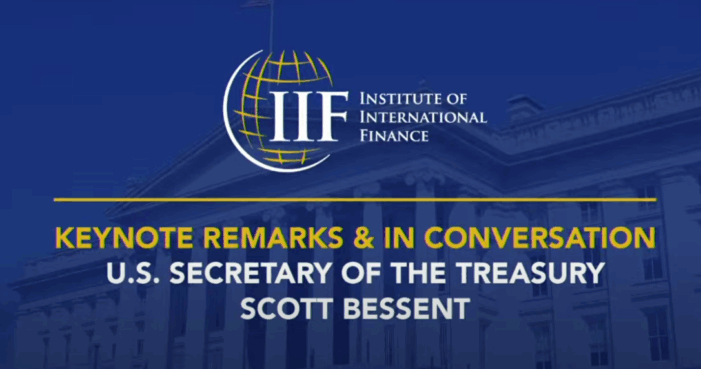Treasury Secretary Scott Bessent delivered a powerful message to the global financial community this morning—one that could mark a definitive shift in America’s approach to economic diplomacy. Speaking before the Institute of International Finance, Bessent laid out a vision that rejects the old playbook of appeasement and excuses. While headlines focused on his critiques of global institutions like the IMF and World Bank, it was his candid remarks on China that are likely to define this moment.
“China needs to change. The country knows it needs to change. Everyone knows it needs to change,” Secretary Bessent declared. “And we want to help it change—because we need rebalancing too.”
That kind of directness has been missing from Washington for years. While previous administrations danced around the issue of China’s unfair trade practices, Bessent, speaking on behalf of the Trump administration, delivered a clear verdict: those days are over.
“For too long, China’s growth model—built on suppressed wages, government-backed overproduction, and an aggressive export strategy—has created damaging imbalances for its trading partners,” Bessent said. “Continuing down this path without reform will only deepen global instability.”
Tariffs Will Stay—Until They’re Earned
Following his speech, Bessent met with reporters and clarified a point that had caused some confusion after President Trump’s recent remarks about tariff reductions. The message? Don’t expect a handout. There will be no unearned concessions.
“The President made it clear: tariffs may come down—but not to zero. And not without meaningful reform from China,” Bessent said. “This isn’t a giveaway. It’s a negotiation.”
This signals a hard pivot from past U.S. policies, which often gave Beijing the benefit of the doubt. This administration, by contrast, is demanding results before rewards.
A Structural Reset—Not Just a Trade Dispute
More than just tariffs are at stake. Bessent outlined a broader agenda aimed at restructuring the very foundation of U.S.-China economic relations—addressing unfair subsidies, discriminatory regulations, and non-tariff barriers that have long tilted the playing field.
“This isn’t about playing hardball,” Bessent explained. “It’s about fairness. We’re restructuring a trade relationship that has hollowed out American industry for too long.”
He warned that China’s current model—focused on exporting its way out of internal economic trouble—can no longer be tolerated. Artificially low wages, excessive savings, and an opaque monetary policy have, in Bessent’s view, forced the rest of the world to absorb China’s imbalances.
“China’s reliance on the U.S. consumer isn’t sustainable,” he said. “We’re not going to keep underwriting a system that exports unemployment to our workers and wealth out of our borders.”
The Door Is Open—But the Clock Is Ticking
Bessent emphasized that this is not about closing the door on China—it’s about encouraging real reform. “The best outcome for everyone,” he noted, “is for China to rebalance its economy, support its domestic consumers, and begin playing by the same rules.”
He also dismissed the media narrative that America’s tough stance is isolating us globally. In fact, quite the opposite is happening.
“Since the tariffs were announced, over 100 countries have approached us about rebalanced trade deals,” Bessent revealed. He added that the U.S. is “very close” to a trade agreement with India—evidence that America is strengthening its global alliances, not weakening them.
A Reset, Not a Retweet
Scott Bessent was clear: this isn’t about political posturing or short-term wins. It’s a two-to-three-year plan to fundamentally reset the terms of global trade.
“This is not a tweet-cycle trade war,” he said. “It’s a long-overdue course correction.”
And that correction is already underway. As Bessent concluded, the world can no longer pretend that China will reform on its own. The United States is stepping up—and inviting others to join in restoring balance, fairness, and common sense to global trade.
In a world full of spin, Secretary Bessent’s speech offered something rare: clarity. And in this new era of economic engagement, clarity may prove to be America’s most powerful tool.

